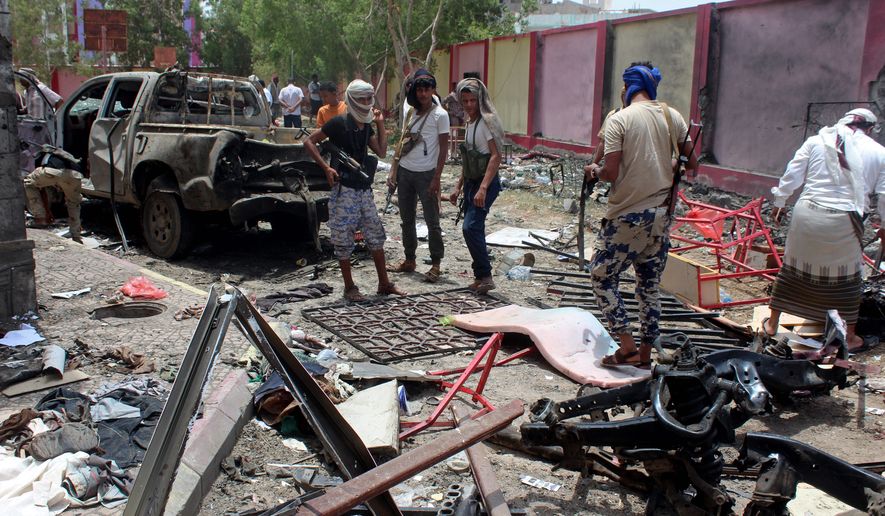As the fight against Islamic State in Iraq and Syria comes to a close, U.S. military and counterterrorism officials are setting their sights on the group’s growing presence in the war-torn country of Yemen.
The number of U.S. airstrikes against Islamic State’s Yemeni faction has increased in the past several weeks as the mission for American drones and warplanes against the group’s bastions elsewhere in the Middle East ramp down.
A trio of deadly strikes this month against Islamic State training camps in Yemen marks a refocus by American counterterrorism forces back onto the Gulf state that has been a regular target of U.S. forces battling the al Qaeda faction known as al Qaeda in the Arabic Peninsula, or AQAP, for the past two decades.
But strikes in the country this month are the first time Washington has gone after the Islamic State inside Yemen.
The uptick in U.S. operations against the Yemeni-based Islamic State cells began in mid-October with an airstrike against a suspected camp in the country’s al Bayda governorate.
The strike, which the Pentagon said was critical to “disrupting the organization’s attempts to train new fighters,” was the first such strike specifically targeting Islamic State in the country.
On Wednesday, American forces launched a pair of airstrikes against another suspected target in al Bayda, reportedly killing nine jihadis tied to Yemen’s Islamic State factions. All told, American warplanes killed roughly 60 insurgents from the group during all three strikes, said Central Command officials, according to reports.
“ISIS has used the ungoverned spaces of Yemen to plot, direct, instigate, resource and recruit for attacks against America and its allies around the world,” Pentagon officials said after the initial Oct. 9 strike, using an acronym for the group.
“U.S. forces are supporting ongoing counterterrorism operations in Yemen against ISIS and AQAP to degrade the groups’ ability to coordinate external terror attacks and limit their ability to hold territory seized from the legitimate government of Yemen,” Pentagon officials added.
U.S. forces have launched over 100 airstrikes against al Qaeda in Yemen this year, according to figures compiled by the Washington-based think tank the Foundation for the Defense of Democracies. The high rate of airstrikes this year under the Trump administration dwarfs the previous high of 46 strikes in 2016 ordered by President Obama.
In comparison, U.S. warplanes launched 119 airstrikes during a single week in mid-March, during the height of the Iraqi and coalition offensive against the Islamic State’s northern Iraqi capital of Mosul.
American air operations have ramped down against the Islamic State significantly since the fall of Mosul in July and the recapture this month of Raqqa, the terrorist group’s Syrian capital and center of its so-called caliphate. U.S. and coalition forces have executed 132 U.S. airstrikes in Iraq and Syria combined since mid-October, according to Defense Department figures.
A failed Navy SEAL raid in February against a high-value al Qaeda target in Yemen was the first counterterrorism mission ordered by Mr. Trump. Navy Chief Special Warfare Operator William “Ryan” Owens was killed and three other team members wounded during the raid in al Bayda.
In response, U.S. Navy warships moored off the southern coastline of Yemen relentlessly bombarded suspected al Qaeda targets in the country, hammering areas near the coastal towns of Shoqra and Zinjibar, just over 60 miles east of the major Yemeni port city of Aden for nearly a week.
Aside from targeting Islamic State and al Qaeda affiliates with military hardware, Washington and its allies are also looking to put a stranglehold on the group’s finances via a slew of new sanctions.
The Treasury Department, along with officials from Saudi Arabia, Bahrain, Kuwait, Oman, Qatar and the United Arab Emirates, issued a landmark series of economic sanctions targeting nine top leaders within Islamic State and al Qaeda’s Yemeni operations.
Working under the auspices of the newly minted Terrorist Financing Targeting Center, it was the first time the countries had put forth a joint effort to disrupt funding toward the extremist organizations.
The targeting center is a “catalyst for additional multilateral actions against terrorist financiers, and a place where member countries come together to fight against these common threats,” Treasury Secretary Steven T. Mnuchin said Wednesday in a statement on the new sanctions.
“Through this action we are aggressively targeting radical extremists in Yemen and the surrounding region who pose a direct threat to the security of the United States, Yemen, and the international community,” he added.
Among those targeted by the new joint center were Adil Abduh Fari Uthman al-Dhubhani, an AQAP financier and former commander with links to Islamic State affiliates in Yemen’s Taiz governorate.
Also listed were Radwan Muhammad Husayn Ali Qanan and Khalid al-Marfadi. The former was the Islamic State’s top commander in the Aden governorate of Yemen and senior leader of operations for all of southern Yemen, Treasury Department officials say. Mr. al-Marfadi was the head of operations in Yemen and also involved in an assassination cell “targeting Yemeni security forces,” department officials say.
Wednesday’s development came roughly four months after the Saudis, the United Arab Emirates, Bahrain and Egypt banded together to impose an economic and diplomatic blockade against Qatar over what they claim are its too-close ties to Iran and suspected support for terrorist groups and political Islamists.
Qatari officials strongly denounced the blockade, and U.S. mediation efforts in the past made little progress.
The ongoing diplomatic standoff with tiny Qatar, which sits atop some of the world’s largest proven natural gas reserves and hosts the most strategic U.S. military base in the Persian Gulf, has proved vexing for the Trump administration as Washington has found itself caught in the middle of the regional dispute.
• Carlo Muñoz can be reached at cmunoz@washingtontimes.com.




Please read our comment policy before commenting.